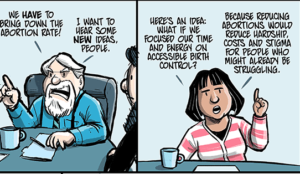The other day I was chatting with my friend Fiona, who had just read Peggy Orenstein’s new book, Girls & Sex.
Girls & Sex explores young women’s experiences of navigating sex within a culture that views female sexuality simply as a performative bargaining chip for male approval – and it had freaked Fiona out.
Fiona has three kids. The oldest, Tandy, is a high school senior. And after reading the book, Fiona became convinced her daughter was on the precipice of having the unsatisfying hook-ups that Orenstein describes.
“It’s so terrifying to think of her going to college and experiencing these awful situations with guys just to feel better about herself,” she said.
I tried to commiserate. But I also felt the need to point out to Fiona that while Orenstein’s book taps into some very real issues, in some ways, it also falls into what the New York Times referred to as a bit of handwringing over the state of young women’s sexuality.
In fact, the more I thought about it, the less I was convinced that Tandy was automatically on this path. What evidence did we have that she might fall into this trap? I mean, this was a kid who had spent a semester abroad as a freshman, played on a travel soccer team, and had a solid group of friends.
Why would we assume that she had any deep-seated insecurities – or that any insecurities she did have would somehow lead to unsatisfying promiscuous sex?
It’s not that Fiona’s concerns weren’t valid. There are definitely issues with hook-up culture, and it’s great for a mother to be concerned about the health of her daughter’s sexuality.
But they were also part of a larger view that positions the driving force behind a young woman’s decision to have sex as insecurity and the need for male validation.
Partly, that happens because many feminists know that navigating the pressures that the patriarchy puts on young women has led to an epidemic of low self-esteem among this group.
And partly it happens because many feminists are well-aware that women have a long history of being subject not only sexual inequalities, but also to sexual violence, and we have been on the forefront of identifying these issues to the larger world and working to eradicate them.
And since this work is by no means over, sometimes we – yes, feminists – slip into a trap of applying our knowledge of larger global problems to the behavior of individuals when it doesn’t quite fit.
Indeed, while insecurity is a factor in some young women’s sexual choices, it sure isn’t a universal motivator.
Still need some convincing? Here are six reasons why we should challenge the idea that insecurity is predominantly what drives young women to have sex with multiple partners.
1. Hyping Insecurity Is Just Another Way to Control Female Sexuality
It’s not news that throughout history, countless societies have tried to control female sexuality. And nowhere is that more clear than when it come to how many sex partners a woman has.
Evolutionary psychologists have theorized that this emerged out of paternity anxiety. But whatever the original rationale, the effects of this model are still keenly felt by countless modern women.
Today, when we position insecurity as the expected explanation behind a young woman’s choice to have multiple sex partners, we continue the historic pattern of denying women the ability to legitimately express their sexuality in any way other than through a (usually heterosexual) monogamous relationship.
And while positing that a young woman might be driven to “promiscuity” out of insecurity may not seem as nefarious as are many other explanations, it’s still harmful.
That’s because defaulting to the idea of insecurity reinforces the sexual status quo – even in empowered women who may not be affected by shaming messages.
A lot of people know that feminists don’t always see eye-to-eye when it comes to sex. There have been long standing disagreements about things like pornography and the sex trade.
But the ways in which we sometimes unwittingly collude in the policing of young women’s sexuality are often more nuanced than one might imagine. And it’s necessary for us to notice and address it.
2. Defaulting to Insecurity Positions a Young Woman’s Sexuality in Relationship to Another (Usually Male) Person
Concluding that young women who have a lot of sex are primarily motivated by insecurity inherently assumes that someone else’s approval is a crucial factor in a person’s sense of self.
But for many people, self-esteem and self-acceptance are not solely dependent on external approval.
However, since American women are constantly bombarded with the message that their worth as a person is directly correlated to how sexually desirable men find them, it isn’t surprising that so many people draw this conclusion.
Indeed, as Jarune Uwujaren writes on this site, “What captures the attention of straight men dictates a lot of what you see in the media, and what you see in the media affects people’s perceptions of women’s worth and desirability. The problem with sexy, attention-grabbing photo shoots and the public response to them isn’t one of certain women making individual decisions.”
So while we absolutely should be criticizing systems, what happens is we can end up critiquing individuals for their choices.
And this leads us to a place where we assume that the primary reason for a young woman to have sex is to please another (presumably male) person in order to gain their approval.
As a result, it denies women the ability to express their own sexual agency – something that generations of feminists have been fighting for.
3. Blaming Insecurity Is an Example of Benevolent Sexism
While some young women do have sex to bolster their self-esteem, using this as the default explanation is a form of benevolent sexism.
Benevolent sexism is the phenomenon where discrimination is couched in favorable terms, and which often comes under the guise of protecting or caring about women. It pops up in a lot of places and is perpetuated by a lot of people, including even some feminists.
Such a view sets up a situation where having sex stems from a root problem that needs to be fixed. And once that problem is fixed, it would follow that so, too, would the desire to have a lot of sex.
That’s something that in this paragon is now only posited as a negative thing.
Of course, plenty of feminists have tried to celebrate women’s sexual expression. But some of the ways that has occurred in recent years also needs examination.
For example, the cries to stop sex-shaming, while laudable, can reinforce the very dichotomies of good women and bad women that feminism has fought to dismantle. Indeed, a consequence of this model can be that you don’t embrace sex openly you are then labeled a prude.
And when those dichotomies are reinforced, we can also see the reinforcement of other ideas, – like, say, that young women are motivated to have sex out of insecurity, even as we’re hoping to honor all women’s sexual choices.
4. The Relationship Between Self-Esteem and Casual Sex Is Complicated
Our sense of self and our levels of confidence definitely affect our sexual choices. Nevertheless, how this presents is going to be different for every individual.
For example, in one study, college women with strong body images said they felt positively about having casual sex. Other researchers have found a correlation between high self-esteem and the number of partners people had, regardless of gender.
Meanwhile, a recent study determined that for people who feel uninhibited sexually, casual sex can be a self-esteem booster, while in those who feel very inhibited, it can have the opposite effect.
Assuming that there’s just one reason that could be behind a woman’s choices loses sight of the myriad possibilities that are out there.
And when we default to the idea that a young woman is having a lot of sex simply because she’s insecure, we ignore the very real fact that she could be doing so because she feels confident, is attracted to a range of people, or simply isn’t bound by traditional conventions about what is sexually appropriate for women.
Indeed, more and more women are publically speaking out about why they have sex, and their reasons often have nothing to do with insecurity.
For example, Corinne Fisher and Krystyna Hutchinson, the hosts of the podcast “Guys We Fucked” have created a whole show with the goal of promoting the idea that, as they say in the first episode, “It’s okay have a lot of sex and be proud of it.”
And Marrie Lobel, the sex and relationship writer behind the website Dirtyinpublic explains, in a piece on shattering myths about female promiscuity, “To assume a woman is ‘broken’ based on how she chooses to express her sexuality says more about how you perceive yourself than how she really is.”
Many of the feminist critiques of “sex positivity” are incredibly important. For example, I deeply appreciate bell hooks’ argument that the focus on the right to engage in sexual activity can ignore the right to refuse to engage in sexual act, or the observation that ideas originating in male-dominated sexology may inadvertently be presented as feminist views.
But feminists can also fall into the trap of dismissing voices calling for sexual liberation as inauthentic or misguided.
5. It’s Often Used in an Adultist Way
Now that I’m forty, my view of how society treats young women no longer comes from being personally marginalized by this marker.
But as someone who’s been there, I can acutely remember the effects of being dismissed offhand as not having enough life experience or self-awareness to really know what I was talking about.
Indeed, young women are often subjected to adultist messages, which wield power and privileging of adulthood over youth, and which tend to infantilize young women for far too long.
So when a young women purports to be having sex because she finds it gratifying, or fun, or a turn-on, she’s often told she isn’t old enough to actually know what she’s talking about. And that she’s really just trying to quell insecurity and find validation through someone’s sexual approval.
This message can be infuriating. And it’s one that feminists of all ages need to keep in check in order to really recognize young women’s experiences.
We can see this in Girls & Sex, but Peggy Orenstein is by no means the only feminist to stumble a little in this area.
6. Blaming Insecurity Distorts Psychological Theories
Thanks to the passing familiarity many of us have with modern psychology and its role in human sexuality, a lot of people like to play amateur analyst when it comes to sex.
And that’s understandable, given that the discipline has given us terms like nymphomania and has introduced ideas about penis envy and Oedipus complexes into the collective conscious.
But while many of are familiar with Sigmund Freud as the originator of those (problematic) views, his were not the only theories to make their mark.
In fact, we owe a lot of what we think we know about the role of insecurity and promiscuity to a psychologist named Dr. Karen Horney – who is often credited with founding feminist psychology.
Unlike Freud, Horney addressed the role of society and culture in her work, and throughout the 1930s and ‘40s, she developed important theories about anxiety and neuroses.
One of her theories was that people who had a childish need for attention were likely to substitute sex for the affection they craved, and that those who moved from one sex partner to another were doing so out of insecurity.
In many ways, this was a progressive view on sex, and one that helped pivot the perception that promiscuous women were sick “nymphomaniacs” to one where they could be seen as having legitimate psychological motivations for their actions.
But while Horney’s theories were an important addition to the understanding of female sexuality, like so many other psychological precepts, they also became an easy diagnosis, applied broadly to women who fit a profile – even if that diagnosis wasn’t necessarily accurate.
For a lot of feminists, these theories have provided the needed authority to challenge damaging perceptions of women’s sexual motivations.
Indeed, it wasn’t so long ago that young women were even sent to reform school just for having sex. So explaining a girl’s behavior through psychology could be life-saving.
But despite the important role of such theories, it’s equally important to understand that the time has come to open to door to the myriad additional explanations that are equally valid.
Challenging the Conventional Wisdom
Recently, I was driving home and One Direction’s “What Makes You Beautiful” came on the radio. Without even thinking, I just started to sing along.
But despite having heard it enough times to know all the words, for the first time, I actually listened to the lyrics. And as I did, I thought, Wow, I really hate this song.
If you have somehow managed to escape it, the song starts with the line “You’re insecure / Don’t know what for” and follows with a chorus that repeats, “You don’t know you’re beautiful / That’s what makes you beautiful.”
It’s catchy, sure. But, it is also just continuing a long tradition of not only positioning insecurity as the antidote to vanity, but also of presenting it as a generally desirable quality in a woman.
Insecurity in this view is feminine, cute, endearing, and non-threatening.
This thing is, insecurity isn’t insignificant. It can devastate someone’s sense of self and can hinder basic functions of living.
Still, as I was reminded of in the car that day, far too often, insecurity is given a positive spin.
And sometimes, that positive spin is even accepted by feminists who fall into the trap of seeing insecurity as a more generous explanation for a young woman’s sexual choices than are the other common rationales.
But just because it seems less critical, that doesn’t mean it is more accurate.
Still, it isn’t only accuracy that’s compromised when we view all acts through the same lens. When we adopt the view that the most likely reason for a young woman to have sex is that she is insecure, we set up a dichotomy where low self-esteem is a justifiable, if unfortunate, reason for having sex with multiple partners.
And as a result, any other reason is then problematic.
Part of being a feminist is constantly critiquing dominant power structures. But sometimes we also need to turn our critical eye to ourselves.
And one good place to start is in our understanding of how we position young women’s sexual choices and experiences.
[do_widget id=’text-101′]
Ellen Kate is a Contributing Writer for Everyday Feminism. She’s a health educator, sometimes writer, and mom. She has worked at Manhattan’s Museum of Sex, developed sex education curricula in Mumbai, India, and run HIV prevention programs for at-risk teens in the South Bronx. Currently, Ellen runs a middle and high school health education program and teaches human sexuality at Brooklyn College. More of Ellen’s writing can be found here. Follow her on Twitter @ellenkatef.
Search our 3000+ articles!
Read our articles about:
Our online racial justice training
Used by hundreds of universities, non-profits, and businesses.
Click to learn more





















